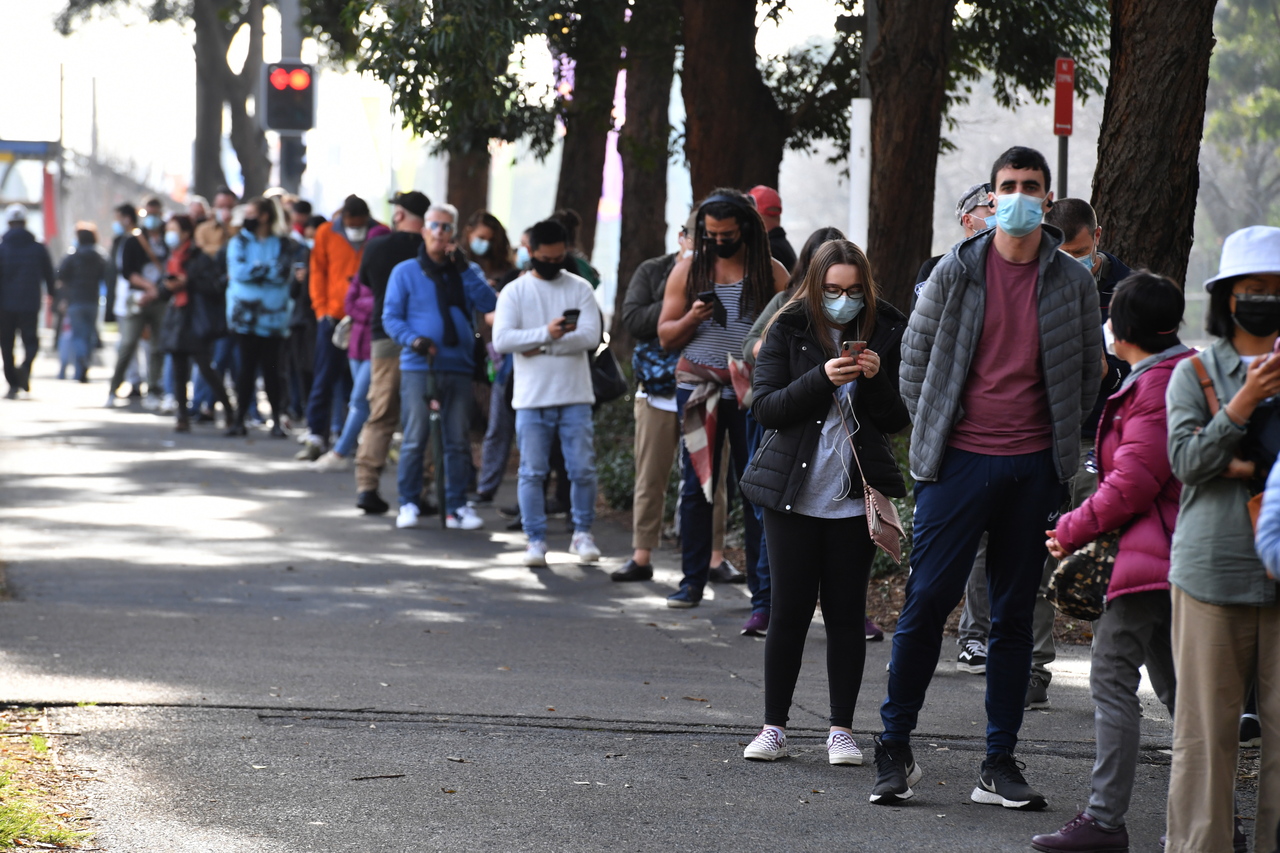Australia's sluggish vaccine roll-out undermines success of its Covid-19 restrictions
Sign up now: Get insights on Asia's fast-moving developments

Images showed thousands of people queueing for as long as four hours to receive a dose.
PHOTO: EPA-EFE
Follow topic:
SYDNEY - When Sydney's 5.4 million residents were forced into a citywide Covid-19 lockdown last week for the first time in more than a year, many suddenly abandoned their vaccine hesitancy and rushed to find a dose.
At the city's mass vaccination hub, located at the site used for the Sydney Olympics in 2000, images early last week showed thousands of people queueing for as long as four hours to receive a dose.
The scenes were a reminder of Australia's mixed record in dealing with the pandemic. Despite being globally celebrated as one of the most successful nations at combating Covid-19, Australia has also gained an international reputation for its "vaccine complacency".
As at Sunday (July 4), less than 7 per cent of Australia's 25.7 million residents were fully vaccinated, leaving Australia at the bottom of a ranking of vaccination rates of OECD countries. A further 24 per cent of Australians have had a first dose.
These low rates are partly due to Prime Minister Scott Morrison's initial belief that Australia should not engage in a speedy vaccine roll-out because it had few or no local cases of Covid-19. Instead, he believed, Australia should wait to learn from other countries' experience with vaccines.
But he has since largely abandoned this approach after a series of new fast-spreading outbreaks demonstrated the ongoing threat that Covid-19 poses.
In addition, it also became clear that Australia, which has some of the world's strictest travel curbs, will be unable to reconnect to the world until vaccination rates dramatically increase.
Earlier this year, Australia opened a quarantine-free travel bubble with New Zealand. But Mr Morrison also wants to set up travel links with other countries, potentially starting with Singapore.
Mr Morrison said recently he would not commit to a firm vaccination rate that would allow Australia to reopen borders.
"We have to be patient for the evidence and the science," he told The Australian newspaper.
However, the New South Wales Premier, Ms Gladys Berejiklian, said last week the state ultimately needed a vaccination rate of between 75 and 80 per cent to return to normality.
"We don't know how long it (Covid-19) will be around for, we don't know if another virus might emerge," she told reporters.
"Until we get the vast majority of our population vaccinated, we won't get to Covid-19 normal."
Yet NSW, like other states, is nowhere near this target. The state, which has 8.2 million residents, has fully vaccinated 6.6 per cent of the population, and a further 22 per cent have had one dose.
Australia's low vaccination rates have been partly due to supply shortages. But the other problem has been the poor handling of the roll-out, which has involved mixed messages about the safety and efficacy of vaccines.
All of this has undermined public confidence in the roll-out and prevented the delivery of a clear message about when and how to be vaccinated.
The federal government has been heavily criticised for repeatedly changing its message about the AstraZeneca vaccine, the main vaccine currently in use. The government initially recommended AstraZeneca should be used only for people aged over 50 after a rare blood clotting disorder was associated with its vaccine that is more prevalent among younger people. Last month, the government lifted the recommended age for AstraZeneca to 60.
But Mr Morrison last week declared that younger people can receive the AstraZeneca vaccine and should approach their doctors if they want it. His statement prompted a backlash from the states, which said he was adding to confusion about whether young people should seek an AstraZeneca vaccine or wait for a Pfizer dose.
The state of Queensland's chief health officer, Dr Jeannette Young, urged people to ignore the Prime Minister's advice.
"I don't want an 18-year-old in Queensland dying from a clotting illness who, if they got Covid-19, probably wouldn't die," she said.
The federal government hit back, describing Dr Young's comments as "extremist".
But Australia's ailing vaccination roll-out is hampering its Covid-19 success.
Australia has had a highly effective approach to tackling outbreaks of Covid-19, deploying immediate lockdowns of varying lengths as local cases emerge. States have deployed successful contact tracing teams and have swiftly communicated known hot spots. Measures have been sensibly enforced and received broad public acceptance. As at Sunday, Australia had recorded 30,756 cases and 910 deaths.
But the Royal Australian College of General Practitioners recently conducted a survey of Australian doctors, which found more than half of its members believed the vaccine roll-out had been ineffective.
"We need to clear up the confusion and build confidence in the vaccine now so we can get jabs in arms quickly as supply increases," the college's president, Dr Karen Price, said in a statement.
"This is a public health emergency of a lifetime. The pandemic is not over."

